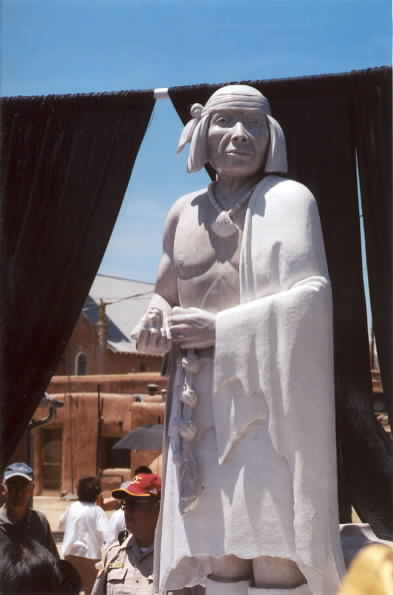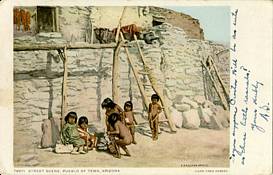Popé {poh-pay'}
(Tewa medicine man)
Pope's Rebellion

Pope, ca.1630-ca.1690, a celebrated medicine man of the Tewa PUEBLO Indians at San Juan, N. Mex., instigated a successful rebellion against the Spaniards in 1680. Preaching resistance to the Spanish and restoration of the traditional Pueblo culture and religion, Pope led his people in an attempt to obliterate all Spanish influence. On Aug. 10, 1680, the Indians under his leadership killed about 400 missionaries and colonists and drove the other Spaniards south to El Paso, Tex. Pope and his followers then proceeded to destroy Christian churches and other evidences of the Spanish presence in Pueblo territory. Thereafter, as the head of several Tewa villages, Pope exerted what many considered increasingly harsh rule. Dissension arose, weakening Pueblo unity, and in 1692, two years after Pope's death, the Spaniards regained control.
Spanish rule of
the
Pueblo Indians of the Rio Grande valley of New Mexico began in
1598.
Although they numbered 40,000 to 80,000 people at that time, the
many
independent towns, often speaking different languages and hostile
to
each other, were unable to unite in opposition to the Spanish.[1]
Revolts against Spanish rule were frequent, but the Spanish
ruthlessly
repressed dissent. The Pueblo suffered abuses from Spanish
overlords,
soldiers, priests, and their Mexican Indian allies, many from
Tlaxcala,
Mexico. In particular, the Spanish suppressed the religious
ceremonies
of the Pueblo. The effects of violence, forced labor, and European
diseases (against which they had no immunity) reduced the Pueblo
population to about 15,000 by the latter years of the 17th
century.
Po'pay
appears in
history in 1675 as one of 47 religious leaders of the northern
Pueblo
arrested by the Spanish for "witchcraft." Three were executed and
one
committed suicide. The others were whipped, imprisoned in Santa
Fe, and
sentenced to be sold into slavery. Seventy Pueblo warriors showed
up at
the governor's office and demanded, politely but persistently,
that
Po'pay and the others be released. The governor complied, probably
in
part because the colony was being seriously harassed by Apaches
and
Navajo and he could not afford to risk a Pueblo revolt. Po’pay was
described as a “fierce and dynamic individual…who inspired respect
bordering on fear in those who dealt with him.
After his release, Po'pay
retired to the remote Taos Pueblo and began planning a rebellion.
Po'pay's message was simple: destroy the Spanish and their
influence
and go back to the old ways of life that had given the Pueblos
relative
peace, prosperity, and independence. The Pueblo revolt displayed
"all
the classic characteristics of a revitalization movement...the
emergence of a charismatic leader, the development of a core group
of
followers who spread the prophet's message to the wider public;
and,
ultimately the successful transformation of Pueblo cultures and
communities."
Po'pay
began secret negotiations with leaders from all other pueblos.
They
agreed to begin the revolt on August 13, 1680 and runners were
sent out
to each Pueblo with knotted cords, the number of knots
corresponding to
the days left before the revolt was to begin. The revolt actually
began
before that. The measure of the Pueblo's hatred of the Spanish is
indicated that he was able to keep the plans secret, even though
they
involved many different leaders and towns. Po'pay murdered his own
son-in-law, Nicolas Bua, because he feared he might betray the
plot to
the Spanish. Only the Tiguex area, close to the seat of Spanish
power
in Santa Fe and perhaps the most acculturated of the Pueblos
declined
to join in the revolt. The Southern Piros were apparently not
invited
to join the revolt.
"Our
dust and bones.
Ashes cold and white.
I see no longer the curling smoke rising.
I hear no longer the songs of women.
Only the wail of the coyote is heard."

Street Scene, Pueblo of Tewa, Arizona
(click on image for larger version)